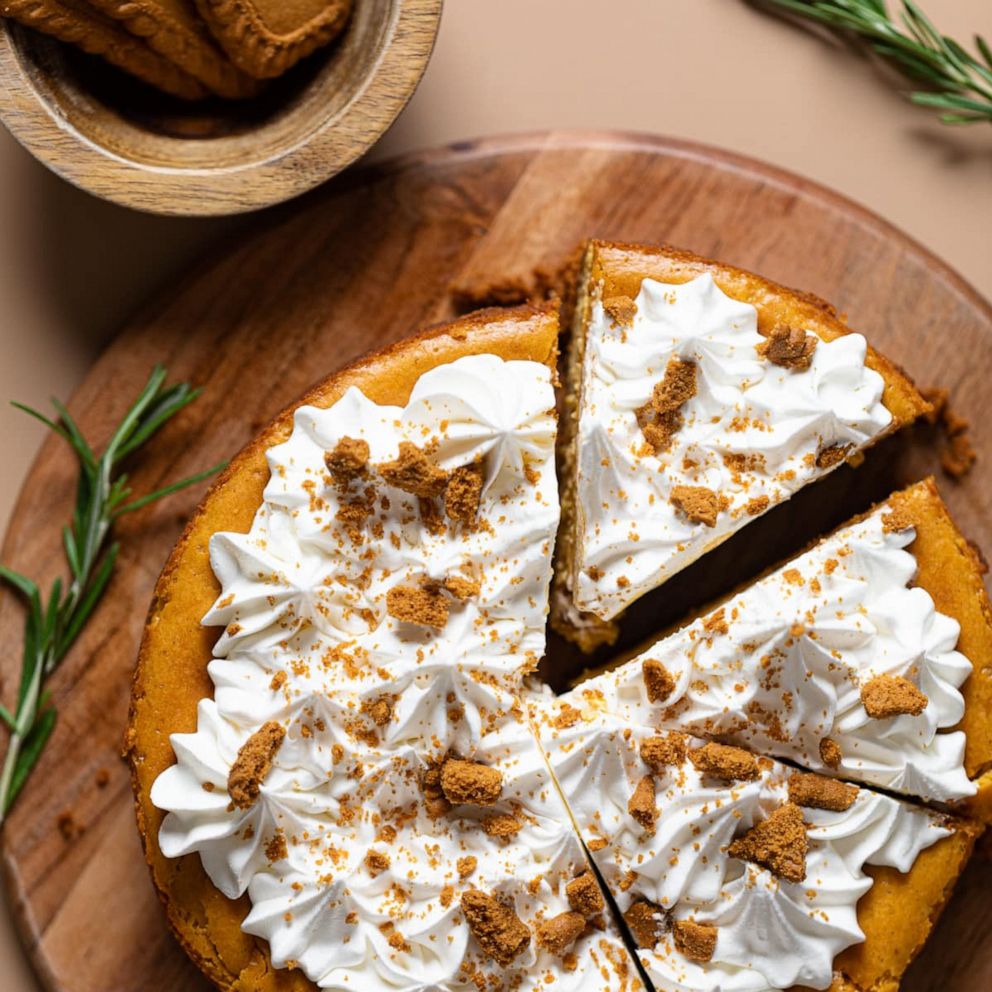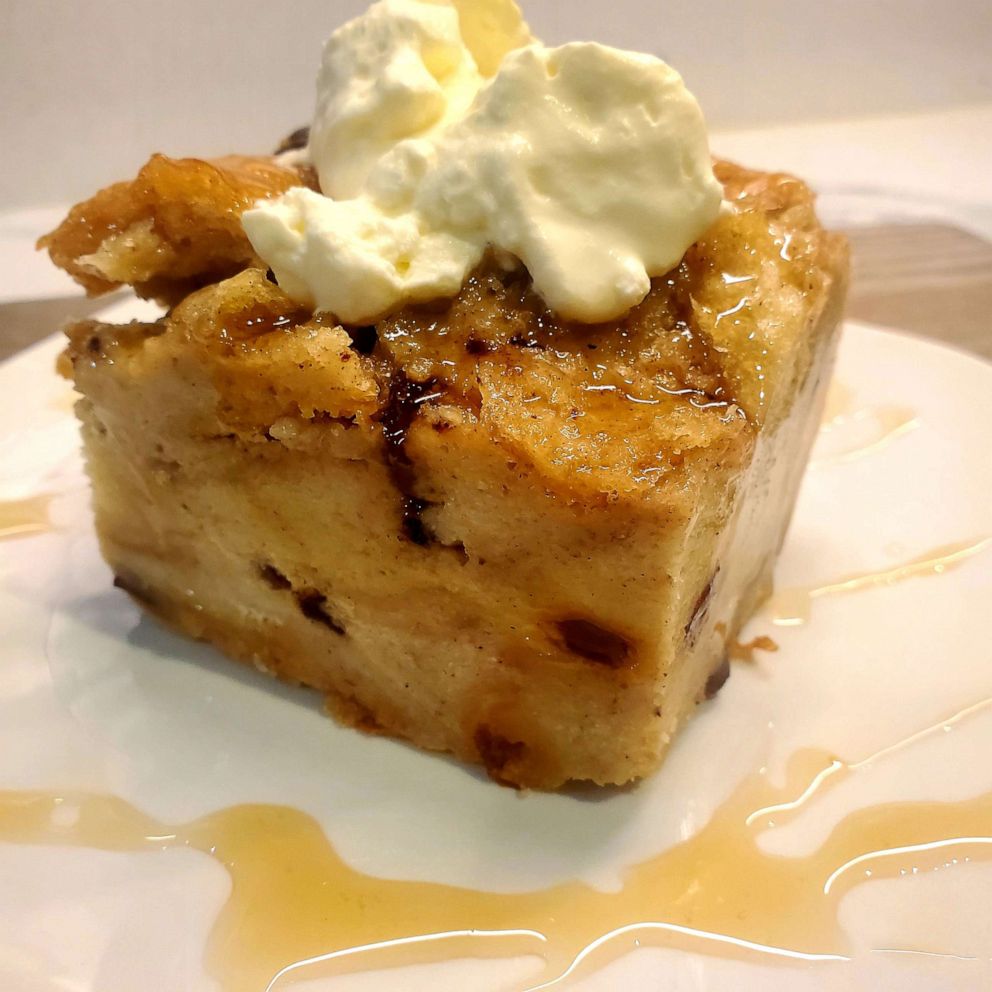2 make-ahead Thanksgiving dessert recipes: Alfajores de maicena, chocotorta
Try these sweet treats from "Pan y Dulce."
Star baker Bryan Ford is helping home bakers get a taste of recipes infused with Latin American culture, which could be a key ingredient in a top-notch dish to add to a Thanksgiving dessert table this year.
Sure, everyone loves pumpkin and apple pie on turkey day, but knowing the purists at the family or friend-filled gatherings will most likely have those bases covered, why not whip up a batch of something unexpected?
Enter, Ford's alfajores de maicena, a buttery sandwich cookie filled with homemade dulce de leche that will melt in your mouth and deliver on all the same rich, sweet flavors any Thanksgiving table will crave after the meal.
Plus, you can make the dessert ahead of time and freeze it until you're ready to bake and assemble closer to the moveable feast.
The Miami-based baker from New Orleans showcases the authentic, artisan world of Latin American baking with his new cookbook "Pan y Dulce."
Check out the full recipes he shared with "Good Morning America" below to elevate your Thanksgiving dessert ideas.
By clicking on these shopping links, visitors will leave Goodmorningamerica.com. These e-commerce sites are operated under different terms and privacy policies than Goodmorningamerica.com. ABC will receive a commission for purchases made through these links.

Pan y Dulce: The Latin American Baking Book (Pastries, Desserts, Rustic Breads, Savory Baking, and More)
- $37.20
- $40.00
- Amazon
Alfajores De Maicena

"One of the most popular alfajores in South America is the alfajor de maicena. Maicena refers to cornstarch, which gives these alfajores an interesting texture: a crumbly yet soft interior that pairs perfectly with creamy dulce de leche. You can find these at most Latin American bakeries and grocery stores in major U.S. cities. The key to cooking an alfajor de maicena is that you can see the layers on the edge, almost like a flaky biscuit dough."
Makes: about 14 cookies, or 7 alfajores
Ingredients
185 grams (1/2 cup) all-purpose flour
140 grams (1 cup) corn starch
15 grams (2 tablespoons) whole grain flour
14 grams (1 tablespoon) baking powder
1 teaspoon orange zest
5 grams (1 1/2 teaspoons) kosher salt
113 grams (1 stick) unsalted butter, softened
80 grams (1/4 cup + 2 1/2 tablespoons) granulated sugar
20 grams (1 1/2 tablespoons packed) brown sugar
1 large egg, plus 2 large egg yolks
5 grams (1 teaspoon) vanilla extract
Dulce de Leche, for filling (recipe below)
Shredded coconut, for finish
Dulce de Leche, makes about 1 1/2 cups
1500 grams (6 1/4 cups) whole milk
310 grams (1 1/2 cups) granulated sugar
1/2 teaspoon baking soda
1 small cinnamon stick (optional)
10 grams (2 teaspoons) fresh vanilla bean, scraped with seeds, or vanilla paste
Directions

To make the dulce de leche:
Combine the milk, sugar, baking soda, and cinnamon stick, if using, in a saucepan over medium heat. Stir until well combined. Let the mixture come to a simmer while continuing to stir, about 4 minutes.
Once it is simmering, set the heat to low and let it simmer for 2 1/2 hours, uncovered, while stirring occasionally. You want to stir if you feel like it is starting to stick to the pan, but I would say about every 15 to 20 minutes should be fine. Halfway through this process, add the vanilla and continue to stir.
Once you get near the end of the 2 1/2 hours, the mixture will start to thicken rapidly and may require more frequent stirring. You are looking for a beautiful mahogany color and a thickness that is slightly runny. You don't want it to get too thick, as it will thicken more when it cools. Be very careful not to touch this with your bare hands. It is extremely hot.
Let the dulce de leche cool and transfer it to a jar. Once completely cooled, you can refrigerate it for a few weeks. This is going to be your best friend, and is the star of the show when it comes to making alfajores and other sweet delights.
To make the alfajores:
In a mixing bowl, combine the all-purpose flour, cornstarch, whole grain flour, baking powder, orange zest, and salt. Whisk together to evenly incorporate and set aside.
In the bowl of a stand mixer with the paddle attachment on medium speed, cream the butter, granulated sugar, and brown sugar. Once those are incorporated, add the egg and egg yolks, one at a time, allowing each to incorporate. Finally, add the vanilla. Once all these ingredients are creamed together, slowly add the flour mixture, and mix until you have a firm dough with no dry flour left in the bowl.
Remove the dough from the mixer and knead lightly. The dough should be soft but slightly crumbly. Wrap the dough with plastic wrap and place in the fridge to rest for at least 30 minutes.
Preheat the oven to 350 degrees Fahrenheit.
Flour a work surface and use a rolling pin to roll out the dough to about 1/2-inch thickness. Use cookie cutters to cut the dough into round shapes. Place on a parchment-lined sheet pan, place the pan in the oven, and bake for 15 minutes.
Remove the cookies and let them rest on a wire rack. Once they are cool, take one cookie and pipe a heaping tablespoon of dulce de leche onto its center. Top with another cookie and roll the sides in a bowl with the shredded coconut. Serve and enjoy.
Alfajores tips:
1. Make sure you chill the dough before rolling it out and cutting, this helps the dough not stick to your counter.
2. Make sure your dulce de leche is stored in a cool place so that it is pipeable and doesn't leak.
3. These cookies are very durable and you can store them in your fridge up to 2 weeks! Likewise, you can wrap and freeze the alfajores for later consumption as well.
4. Make sure to go for finely shredded coconut on the outside of the alfajore as opposed to bigger shards for a better textural contrast in your bite.
Chocotorta

"Chocotorta is a popular Argentine dessert that consists of layers of chocolate cookies and a dulce de leche-infused cream filling. The cookies, though, are the star of the show. The ones traditionally used in Argentina are a brand called Chocolinas -- but don't worry, we will make some cookies similar to those in this recipe. It's a delicious cake that has become a staple of the Argentine dessert world; one of the reasons for its popularity is its simplicity. The preparation is straightforward and so easy to modify that many families have their own variation of the recipe, with some using different types of cookies or additional ingredients."
Makes: 1 cake
Ingredients
Chocolate cookie
325 grams (2 1/2 + 1 1/2 tablespoons) all-purpose flour
115 grams (1 1/3 cups) cocoa powder
8 grams (1 3/4 teaspoons) baking powder
2 grams (1/2 teaspoon) kosher salt
200 grams (14 tablespoons) unsalted butter
150 grams (3/4 cup) granulated sugar
150 grams (3/4 cup packed) brown sugar
2 large eggs
5 grams (1 teaspoon) vanilla extract
Crema filling
340 grams (1 1/2 bricks) cream cheese
100 grams (3/4 cup + 1 1/2 tablespoons) powdered sugar
250 grams (2/3 cup + 2 tablespoons) dulce de leche
Cookie soak
175 grams (3/4 cup) brewed coffee, cooled
175 grams (2/3 cup + 1 tablespoon) whole milk
Chocolate frosting
113 grams (3/4 cup) chopped chocolate
75 grams (1/3 cup) heavy cream
Directions
For the cookies: In a large bowl, sift the flour, cocoa powder, baking powder, and salt. Whisk together and set aside.
In the bowl of a stand mixer fitted with the paddle attachment on medium speed, cream the butter, granulated sugar, and brown sugar. Once combined, add the eggs one at a time and finish with the vanilla.
Remove the mixing bowl with the wet mixture from the mixer and add half of the dry ingredients to this bowl. Mix and fold in with a spatula. Once combined, add the rest of the dry mixture and fold again until completely combined.
Divide into 2 pieces, wrap with plastic wrap, and refrigerate for 2 hours. Once chilled, preheat the oven to 350 degrees Fahrenheit.
Roll the dough out with a rolling pin and cut into about four or five 8-by-4-inch rectangles. Place each rectangle on a parchment-lined baking sheet and bake for 10 to 12 minutes. Let the cookies cool completely and set aside.
For the crema filling: In the bowl of a stand mixer with the paddle attachment, add the cream cheese and powdered sugar, and beat together on medium speed. Once smooth, remove the bowl from the mixer and fold in the dulce de leche with a spatula until combined. Set aside.
For the chocotorta: Line an 8-by-4-inch loaf pan with plastic wrap.
Pour the brewed coffee and milk onto a sheet pan and dunk each cookie in this mixture -- you don't want to soak it so heavily the cookie falls apart. If you have a bowl large enough to fit the cookie, that works too, but I usually just use a sheet pan.
Add a soaked cookie to the loaf pan as the base layer. Each cookie should be roughly the size of the loaf pan, but make adjustments as needed for them to fit.
Next, use an offset spatula or the back of a spoon to spread a few tablespoons of the crema filling evenly over the cookie. Top with another soaked cookie, spread more crema filling, and repeat 4 more times. Make sure to save leftover crema filling to pipe onto the top during the final assembly.
Once the top cookie has been placed, wrap the loaf pan completely with plastic and place the chocotorta in the fridge for 24 hours (you can also freeze this for longer-term storage, up to two weeks to avoid a freezer-burned taste).
For the chocolate frosting: In a microwave-safe bowl, add the chopped chocolate and heavy cream, and microwave for 3 to 4 minutes. Let sit at room temperature for 10 minutes and then whisk together until thick and creamy.
Take the chocotorta out of the fridge and invert onto a plate (this means the first layer you put in the loaf pan will actually be the top layer).
Remove the plastic wrap and spread the chocolate frosting on the top (and the sides, if desired). Pipe the remaining crema filling in dollops over the frosting, if desired. Cut and serve.
Chocotorta tips:
1. Allow the cookies to cool completely before assembling. This step is essential to ensure the filling spreads smoothly without melting. Don't skip the cooling process!
2. When soaking the cookies, be cautious not to oversoak them, as this can make them soggy and prone to falling apart. A light, quick soak is ideal -- just enough to absorb the flavor.
3. Freezing is an option for storing this torta, but be mindful that freezer-burn can affect the taste. For the first few days, it's best to store it in the refrigerator.
4. Bake promptly. After mixing the batter, get the cookies into the oven as soon as possible. The leavening agents activate immediately upon contact with wet ingredients, so a quick bake ensures the best results.
Excerpted from "PAN Y DULCE" by Bryan Ford. Copyright © 2024 by Bryan Ford. Photographs by Brittany Conerly. Used with permission from Voracious, an imprint of Little, Brown and Company.
More GMA Kitchen Picks


Nordic Ware Naturals Aluminum Commercial Bakeware for Even Baking - USA Made Cookie Sheet Pan, Oven-Safe Essential
- $29.99
- Nordic Ware


3 Pack Bread Pan for Baking Loaf Pan Set, 8.5 x 4.5 Inches Loaf Pan with Wide Grips Nonstick
- $13.99
- Amazon







